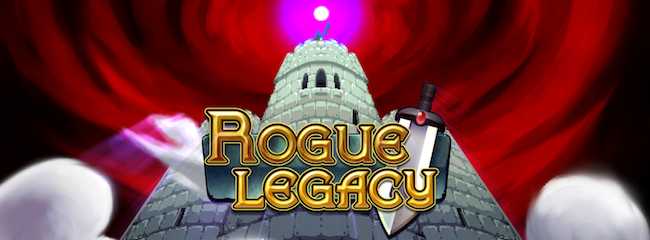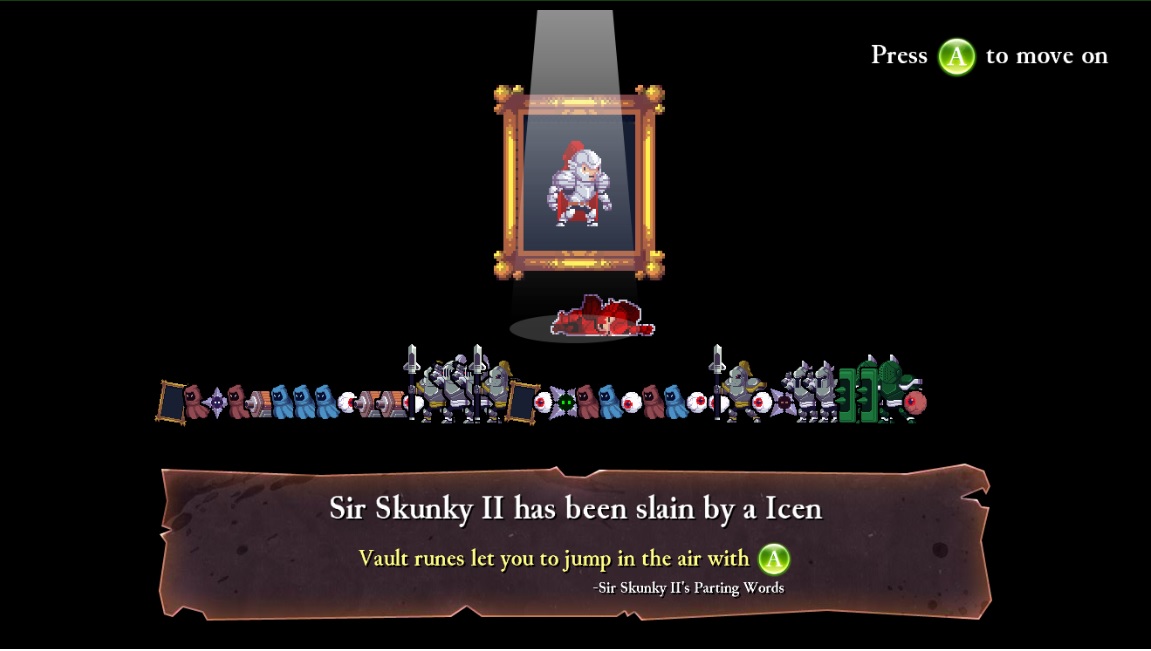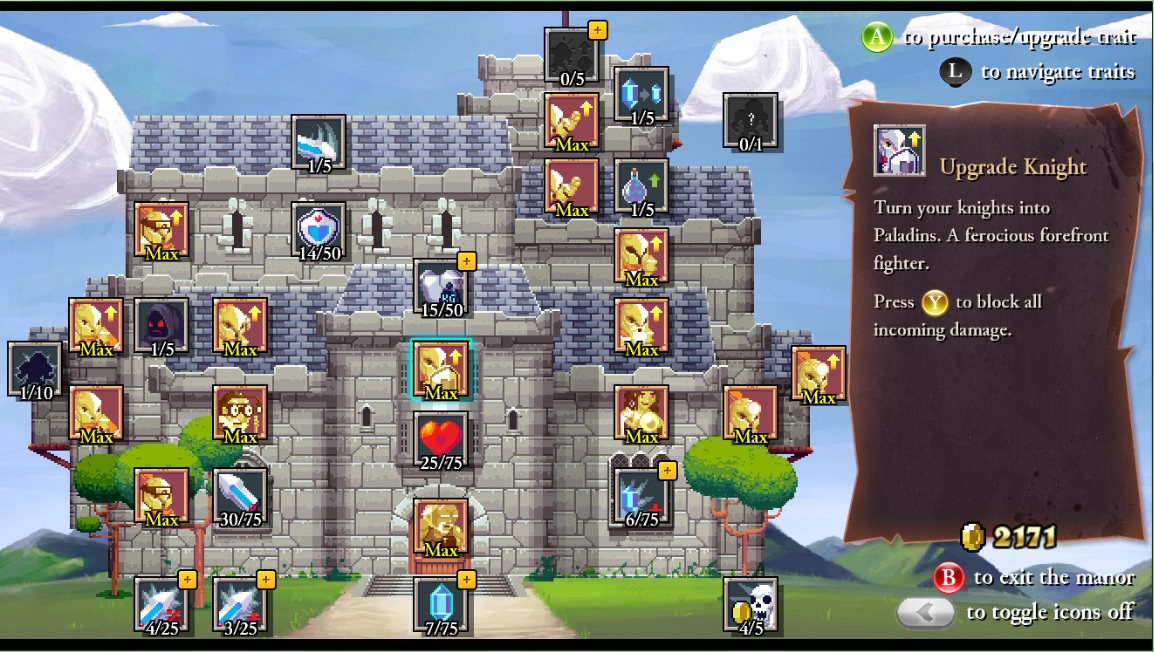
Developed by Cellar Door Games, Rogue Legacy is about a King in peril, and a long suffering family line born from a legendary knight who tried to save him. Their chosen method is questionable, however, since it consists entirely of throwing themselves endlessly into a castle shaped grinder made from monsters and magic, and hoping something sticks. However, the story is quickly forgotten, and whilst I only completed it for the first time just last week, I’ve already forgotten the main story line and have to refer to the online wiki to refresh my memory. The fun is in the dungeon crawling, made consistently challenging by the randomly generated maps with each continue and in honing your ability to handle the different player classes, all of which you’ll have ample opportunities to test out due to a difficulty curve that could only be described as sheer. Respawning doesn’t exist in the Rogue Legacy world so when your character dies they don’t come back, instead adding to an inevitable, exceedingly long line of family portraits, and the chosen heir steps up to the plate to take on the Castle (I imagine with some hesitation, considering the low life expectancy). Of course, this happens pretty frequently, so after you die for the tenth time because of those damn spike traps, their jagged pixels impaling you while you were trying to escape the Flame Wizards, you’ll get pretty used to going back to the main menu and starting again.

With the lives of our heroes being so hilariously short, the fun is certainly in the dungeon crawling, and addiction is in “fun-sized” bite form; just like the creepy journals scattered around the castle suggests, time inside of the castle behaves strangely and I easily lose track of how long I spend inside it. The difficulty is such that any new player will be absolutely terrible, which makes any slight victory feel like such a massive achievement, and when any given run might only last (on average) about five minutes the temptation to play “just one more” round probably shouldn’t even be called a temptation. It’s an inevitability… I had to be dragged away from the game in order to stop. Dying in the same place because of carelessness, or because of one tiny hit that managed to get through my defense, or because I simply wasn’t prepared for a new kind of monster or trap, all of it was incredibly frustrating because of the frequency with which these things happened. It isn’t the first game I’ve dropped a significant amount of time into, but it is the first game that’s made me want to keep playing because each death brings me a little closer to something that could be generously described as progress. Until a Gray Knight charged at me from behind, impaling me on his pole-arm and I had to start again.
There are also little “ha-ha” moments in the game that keep you replaying just to see everything it has to offer, and sometimes what it has to offer is totally insane; I’ve had an Arch Mage dwarf, suffering from Coprolalia and ADHD, sarcastically dissed by a Clown in the attic of a Castle where he had set up a carnival game of throwing daggers at targets. There are references to Greek mythology, small peeks into Cellar Door Games’ past progress in the development of Rogue Legacy and other web-games they’ve produced, and an assortment of nods to various pop-culture in-jokes that can give you a good chuckle if you catch them. These are all secondary to the humor created by the context of the game itself, however, and the developer manages to subtly insert them sparingly so that they aren’t a constant drain on your focus. They’re more like an occasional reward for your progress toward the main objective, something which quickly changes from the games intended story, to looting as much cash as possible (since the money lets you buy more upgrades to beef your family genetics). If you’re anything like me, however, then you’ll get so caught up in a single good run that you start playing too recklessly, your greed overriding your common sense, and you’ll run straight into a room without floors and plunge 50 ft to your death in the spike pits. Then you’ll respawn, buy a bunch of upgrades, and start again.

Indie games are on the rise in popularity, and with a flood of great titles coming in from the community, filling the gaps between major publisher releases and occasionally even competing against them, it’s easy to miss a lot of games just because you chose to play something else and never looked back to the other titles. Rogue Legacy definitely falls into this category for me, it came out back in June, and I only picked it up in the last few weeks; The solid gameplay, 80’s style, console throw-back feel of the world that’s been created, and the crack-like addiction that it inspires in its players, all creates a potent lure of guaranteed entertainment and that is what keeps me coming back to it in the midst of releases like GTA:V, Pokemon X & Y and Batman Arkham Origins. It’s an indication of just how far Indie games have come in the past few years that a title like this can be put out and be every bit as engaging as their big-budget counter-parts, taking advantage of community oriented platforms like Steam and Desura (and soon XBox One and Playstation 4) to show that vast amounts of money and resources aren’t needed to make a great game (though it is required to reach the top levels of the tech tree). No amount of time, however, will help me to remember that I need to change both my equipment and runes when I switch to a class I’m not used to playing, and prevent me from slamming face first into the hail of ballistics being launched at my slow-jumping character. Then I forget to do it once more after I’ve started again.

As the next generation consoles lumber their way towards us the idea of total digital distribution is coming into focus as being an inevitable future for us all, and this is the first real stab that the console market tried to make towards that platform. Unfortunately, Microsoft swung too hard, too early, and ended up stabbing itself in the shins, slowing themselves and their peers down before they’d even really started, but one of the few things to have come about from the announcements during E3 was that both MS and Sony will allow Indie developers to self-publish. It means that if the Indie developer scene continues to grow, periodically issuing forth works like Rogue Legacy, then the potential for future releases by the same developers to be far greater than what they’ve already achieved, with the support of a multi-platform audience, makes me so excited for what we’ll get to play in the next few years. This is assuming that creative control over content isn’t explicitly censored in favor of either Publishers grander market vision, or that they’ll even make the games available to everyone (Microsoft’s Indie Arcade service is still not available in Australia), or even if they’ll stick to their promise of making the Indie games prominent in their respective online stores. Whatever the outcome, there are a thousand more heroes to be valiantly sacrificed in the quest for more treasure and something about a king after I start again.











